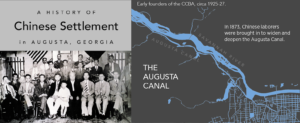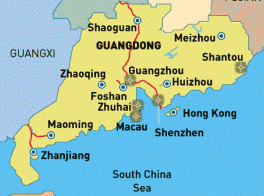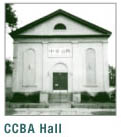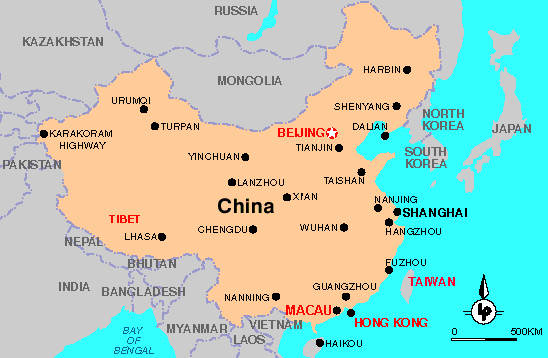 Because of its long maritime involvement, the province of Guangdong in Southeast China accounted for the bulk of 19th century Chinese immigration to the United States. More than 80% of the Chinese in the United States trace their roots to a small region in Guangdong Province about the size of the San Francisco Bay area. Most of the early families of the Chinese Consolidated Benevolent Association of Augusta (CCBA) were immigrants from this area.
Because of its long maritime involvement, the province of Guangdong in Southeast China accounted for the bulk of 19th century Chinese immigration to the United States. More than 80% of the Chinese in the United States trace their roots to a small region in Guangdong Province about the size of the San Francisco Bay area. Most of the early families of the Chinese Consolidated Benevolent Association of Augusta (CCBA) were immigrants from this area.
HISTORY OF THE CHINESE IN AUGUSTA, GEORGIA
In 1873 an Indianapolis construction company contracted and brought to Augusta, Georgia about 200 Chinese male laborers to widen and deepen the Augusta canal. When the project was completed 2 years later, most of these men drifted off to work elsewhere. The few who remained opened grocery stores in the Augusta area.
The 1880 Census reported 10 Chinese living in Augusta (out of a total of 17 in Georgia) and 8 Chinese grocery stores. By 1900 Augusta’s Chinese population increased to 41 people. There were now 29 Chinese grocery stores and 8 laundries. During these early years there were virtually no Chinese families in Augusta due to the Chinese Exclusion Acts which strictly regulated Chinese immigration including women and children to the United States.
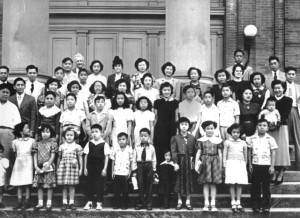
In 1885 the First Baptist Church of Augusta began a Chinese Sunday school to minister to the men living in Augusta. It is one of the oldest organized Chinese Sunday schools in the nation and continues today, having served the Chinese community for over 135 years. Please visit the First Baptist Church of Augusta’s website for the Chinese Sunday School schedule.
The nucleus of the present day community of CCBA families began around 1915 with the arrival of wives and families to Augusta. Augusta’s Chinese community began to grow and the 1940 Census reported a Chinese population of 224 and 63 grocery stores. Even though the Chinese population continued to grow, the number of grocery stores began a slow, steady decline starting the the 1950s. These grocery stores are no longer in operation today.
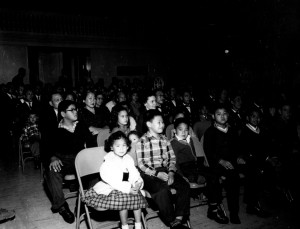
Fifty-nine local Chinese men signed a petition in 1927 to charter the Chinese Consolidated Benevolent Association of Augusta. The Association met in several locations until 1939 when it acquired a vacant Lutheran Church built in 1859. This facility became and remains today as the hub and focus of the CCBA community. Chinese schools, banquets, weddings, and numerous events have been held in this building throughout the years. The building has undergone numerous renovations and is continuously being renovated to meet the changing needs of the CCBA community.
Beginning in the 1970s, Augusta saw an influx of Taiwanese professionals who later formed the CSRA Chinese Association. This trend accelerated in recent years due to an increase of Chinese students and faculty members at the Medical College of Georgia. There are now four Chinese associations in Augusta: (1) the CCBA, (2) the CSRA Chinese Association, (3) Augusta Chinese Christian Fellowship (ACCF) who also manages the CSRA Chinese Cultural Center (formerly known as the Chinese School), and the (4) Augusta University Chinese Students and Scholars Association.
HISTORY OF THE CCBA HALL
In February 1859 the St. Mathews German Lutheran Church was formed and purchased a lot at 548 Walker Street for $1200 to build a sanctuary. Construction began in July 1859 and the church was built at a cost of $6800. There was no electricity at that time. Two large windows in front and eight large windows on the sides provided light and air.
In the following years, renovations were made to the church.
- In 1874 a parsonage was built to the left of the church.
- In 1893 a brick Sunday School building consisting of a large assembly room and a stage was added to the back of the church.
- In 1896 extensive renovations were made to include an electric light system, a hot water heating system (radiators), cementing on the building exterior to look like stone and carpeting.
- In 1902 a recess alcove, primary room and library were added to the Sunday School.
In 1921 St. Mathews merged with Holy Trinity to form the Evangelical Lutheran Church of the Resurrection and a new sanctuary was built in 1926 on Greene Street. Over the next 13 years, the Walker Street building was used by other churches and changed ownership several times. The CCBA bought the property in February 1939 for $2,500. The parsonage was not included in the sale.
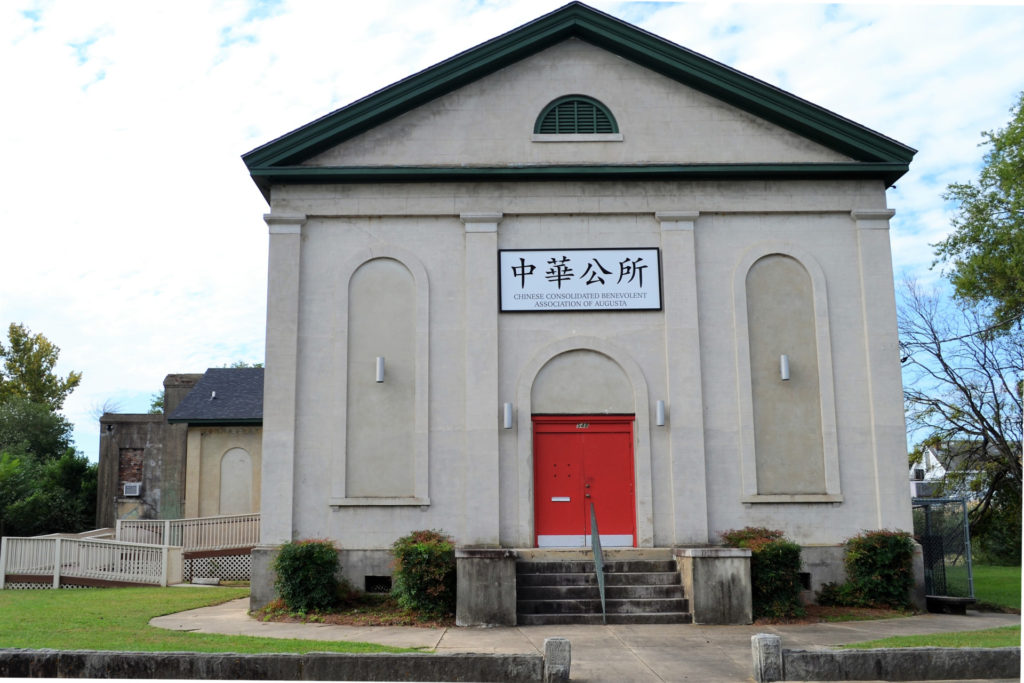
- The Sunday School assembly room became our gym.
- A new kitchen, bathrooms, front room carpet, and central heat and air were installed.
- The open balcony at the entrance of the church was enclosed.
- The large windows that originally provided air and light in both the front room and gym were blocked up.
- A modern kitchen was built in the area of the stage.
- Central air and heat replaced individual gas heaters and fans placed along the boundaries of the front room and gym.
- The high ceiling in the front room was lowered.
- The front room walls were paneled.
CCBA Timeline
1880 – Eight Chinese grocery stores were in operation
1882 – Chinese Exclusion Act prohibits the immigration of Chinese laborers
1885 – First Baptist Church of Augusta established Chinese Sunday School.
Magnuson Act repeals Chinese Exclusion Act; allows Chinese nationals already in the country to become naturalized citizens; allows a quota of 105 Chinese immigrants per year. CCBA sponsored Rice Bowl parade was held on Broad Street to raise money for China war relief.
CCBA Chinese Women’s Club established in Oct, 1948 and Mrs. B.N. Loo was the first President. Two Chinese language / culture classes were held at 548 Walker Street on Monday through Friday from 6:00 pm until 9:00 pm. Two dialects were taught. About 20 students ranging in age from first grade to high school were in attendance. Dr Kun Ken Hu was the teacher.
1955 – Chairperson James Woo organized first Orchid Brocade Christmas Dance
Carpet, central air and heat was installed in the front room of the CCBA Hall. There was a 50th Anniversary street festival. Danny Wing was President.
Bingo funded the kitchen & bathrooms renovations at the CCBA building. Suey Chong Loo was President. CCBA Constitution and by-laws were established and Ellen Dong was chairperson.
China was the featured country at the Arts in the Heart of Augusta Festival; Gary Tom was President. The 1st edition of the CCBA cookbook was published; Raymond Rufo was chairperson.
The first Meet and Greet reception for Children From China was held in May, 2003. China was again the featured country at the Arts in the Heart of Augusta Festival. Gary Tom was President.
CCBA established the Children Summer School and Kathy Rufo was chairperson of this committee. Children’s Language & Culture Class established with LD Newman as teacher.
Georgia Humanities Council awards CCBA an oral history grant. Kathryn Rufo was chairperson. CCBA received the oral history grant and begins recording oral histories.
“A History of Chinese Settlement in Augusta, Georgia” was an exhibit that debuted in May 2011 at the National Archives in Morrow, as part of the Asian Pacific American Heritage Month Symposium. Travis Tom, a board member of CCBA and the curator of the exhibition, highlights the development of the Chinese Consolidated Benevolent Association, the Chinese Sunday School, the history of the Augusta Canal, Chinese merchants, Chinese war veterans, and the impact of the Chinese settlement that impacted the social, economic, and civic growth of Augusta
CCBA partnered with Goodwill Industries to host the 1st annual Good Boats Dragon Boat Race and Festival. A presentation ceremony of the Oral Histories and Photographic Exhibit was held at the Augusta Richmond County Library (Kathryn Rufo and Travis Tom). Demolition of the parsonage home at 544 Walker St was approved by the city. Ray Rufo was chairperson. Ray Rufo presented the CCBA community oral history project at the APA Historic Preservation Forum in Los Angeles, CA. CCBA letter of Affirmation supporting GRU application for Confucius Institute – Ray Rufo, President.
The 544 Walker St parsonage home was demolished. Ray Rufo was chairperson. New floor was added in the front room of CCBA Hall and a concrete storage pad was added in the basement. Ray Rufo was chairperson. CCBA received Goodwill’s Community Partner of the Year Award.
CCBA increased its web and social media presence with a redesigned website and updated content. Also a new CCBA Facebook Page was created and led by Danielle Moores. GRU Confucius Institute officially opens. Dr. Ricardo Azziz, GRU President, recognizes the CCBA’s contributions in obtaining the Confucius Institute status.
New CCBA Directory was published. The 553 Watkins Street property behind the schoolroom was acquired via a donation from Sally Lam (lot was cleared in 2020 and fenced in 2021).

